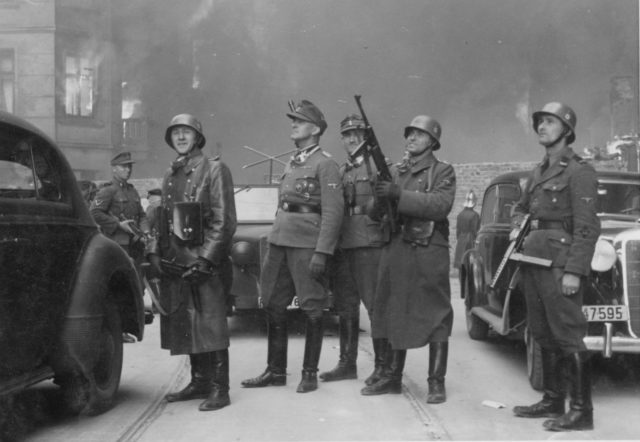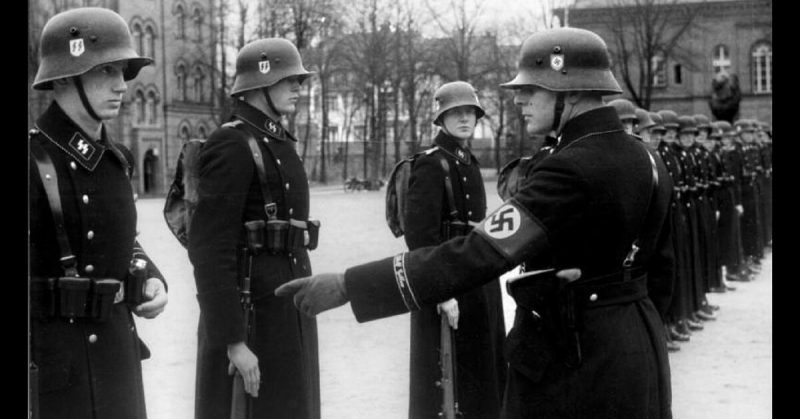As leader of Germany, Hitler transformed the officer corps. It brought fresh blood into the army. It also created problems, some of which eventually led to weakness and violence.
Before Hitler: Working Within Versailles
Before Hitler ascended to power in 1933, the German army was confined by the Versailles treaty. The agreement, implemented at the end of WWI, severely limited the German military. The general staff was abolished, and the Staff College closed. The army was restricted to 100,000 men in total, and fewer troops meant fewer officers. In short, Versailles severely constrained the officer corps.
An Accidental Elite
In doing so, the Allies intended to weaken and limit the pool of command talent available to the Germans. Instead, they fostered an elite.
In the limited economy of post-WWI Germany, secure jobs were few and far between. The Versailles settlement stated those serving in the army had to do so for twelve years – a measure meant to prevent Germany building up reserves of trained soldiers. It made soldiering one of the most stable jobs. Instead of being put off working in a diminished army, skilled and educated men were drawn to it.
The Reichstag set a high standard for those applying to become officers. As a result, the best and brightest of applicants got the limited available posts.
The Strength of Tradition
Many of those joining the officer corps came from the upper classes. They had the education and connections to get in and were motivated by a strong sense of patriotic tradition.
It led to an officer corps that was conservative and traditionalist. Hindenburg, one of its most famous representatives, stopped to salute the empty seat of the long-dethroned Kaiser on his way to see Hitler take power.
The culture was reinforced by the lack of opportunities for promotion or for young men to join. In 1933, the average age of a German colonel was 56.
Expansion
Rearmament was a key feature of Hitler’s agenda. On taking power, he vastly increased the size of the army, going from 7 to 21 divisions. Artillery, tanks and the Luftwaffe were added. In just six years, between German recruitment and the absorption of the Austrian army, he brought the army up to 103 divisions.
It led to a vast increase in officer recruitment. The culture of the officer corps was transformed.
Transformation
The new recruits tended to be very different from those who had come before. Instead of country-living aristocrats, they came from the urban masses. Many were Nazi party members and products of the Hitler Youth. Energetic and ideologically driven, they sought change over tradition. They embraced new ways of fighting and new attitudes to society.
Favored by the political establishment, they rose through the ranks.
Hitler had made the officer corps much larger, younger, and more dynamic; but it came at a price.

Divisions
Huge divisions emerged within the army.
The new officers saw the old guard as too conservative and out of touch with modern warfare. Politically, the two groups were also at loggerheads. While Germany’s traditional elite worked with the Nazis, it was not a comfortable alliance. They valued stability and security and looked down upon the masses to whom Hitler appealed.
Deliberate divisions meant coordination within the army worsened. Hitler developed separate military staff, including his own. The SS emerged as a military force, distinct from the army but sharing its duties. By making himself the key connection between them, Hitler controlled his subordinates through a strategy of divide and conquer which hampered cooperation.
Removing Independence
Aside from expansion and division, Hitler’s other most important change was to deprive the military of its independence. The Ministry of War was abolished in 1938, replaced by Hitler’s own Supreme Command group (OKW). He replaced the conservative head of the military and eventually took the position of commander-in-chief himself.
It was an approach that allowed Hitler to supervise officers more closely and to keep them following his agenda. However, by depriving them of independence, it reduced their ability to show initiative.
Ill Feelings Around OKW
Unsurprisingly, restrictions on their independence created resentment from many officers, especially the old guard. OKW, the voice of Hitler, became a major target of resentment.
It did not help that OKW’s principal officers were all drawn from the army. Germany was primarily a land power, and so it was natural the army would provide many senior commanders. However, not including the navy created resentment. The commanders of battleships and submarines risked their lives fighting the Allies in the Atlantic. They knew that their perspective and concerns were secondary to those of their land-based comrades.
Lack of Dissent
As well as removing the independence of action, Hitler stifled freedom of speech. Dissenting voices were strongly discouraged by a regime that relied on bullying to maintain its dominance. Hitler seldom responded well to anyone disagreeing with him.
Some officers tried to tell the Fuhrer when they thought he was wrong. Heinz Guderian did so repeatedly and was fired for it. He was not the only one.
The old officer corps had been conformist by culture, but at least there had been the potential to express different views. Before WWI, it had developed some of the most advanced and articulate thinking on modern war. Under Hitler, there was only the party line and no dissent.
Weakness and Revolt
The result was an officer corps that lacked both the independence to correct their leader’s mistakes and the strength of character to oppose him. A core of talented traditionalists sat in opposition to a larger, more motivated, but less gifted mass of modern men.
Under Hitler, the German officer corps gained new talent, ideas, and energy. It also increased resentment and limitations that weakened it and eventually led to attempts by resentful officers to assassinate Hitler.
Source:
John Keegan (1987), The Mask of Command;
